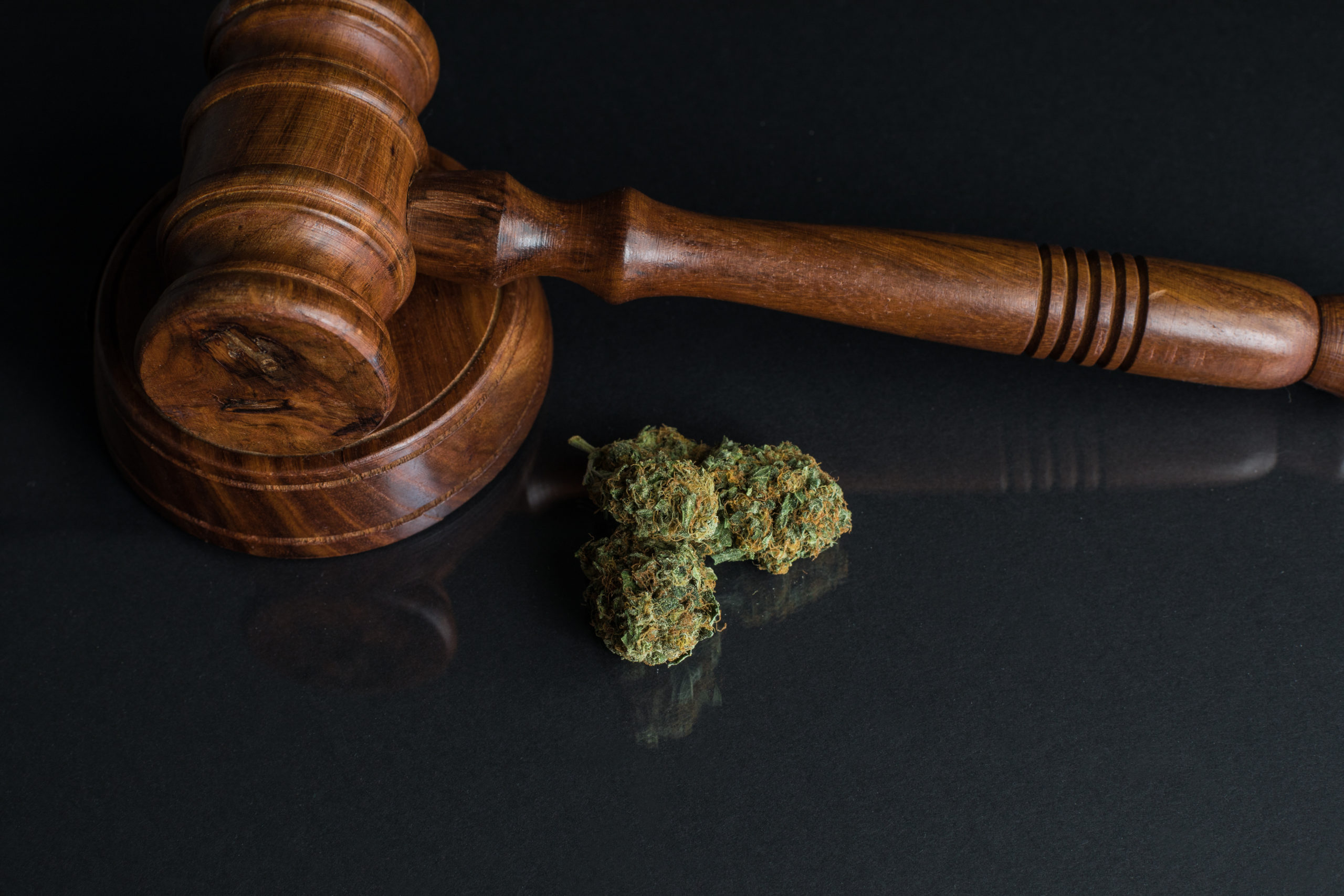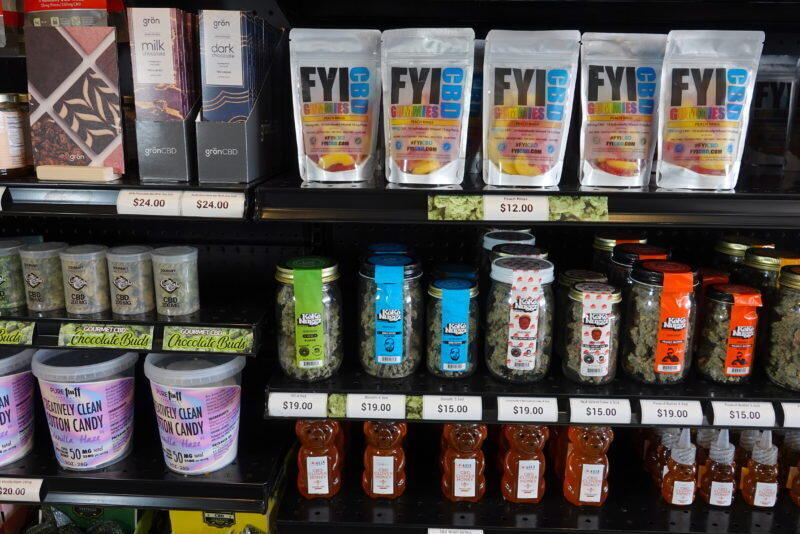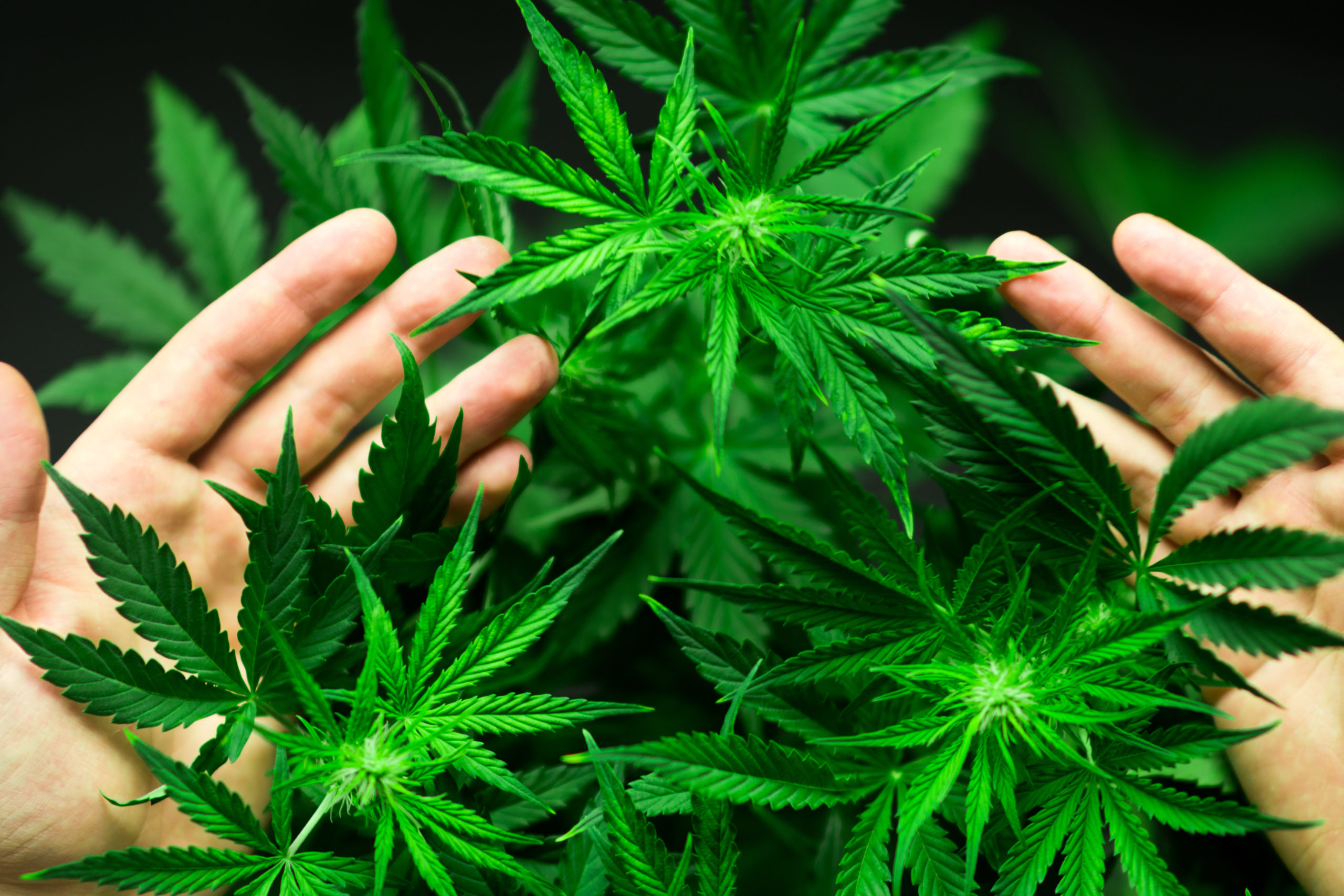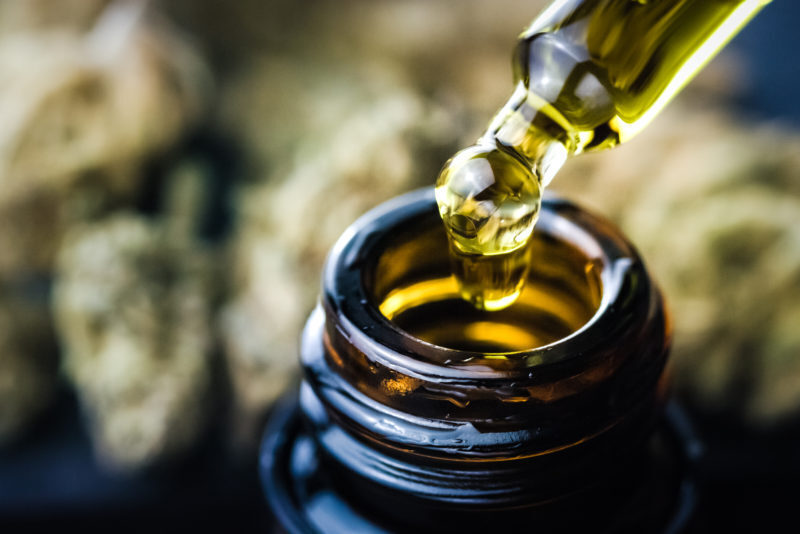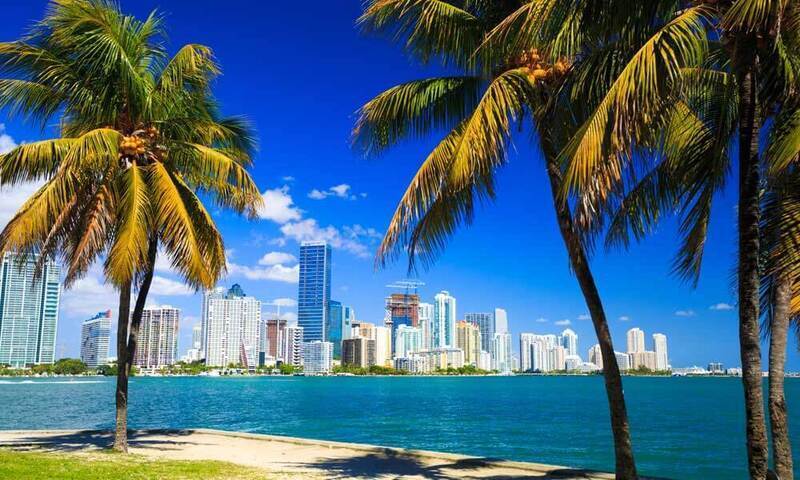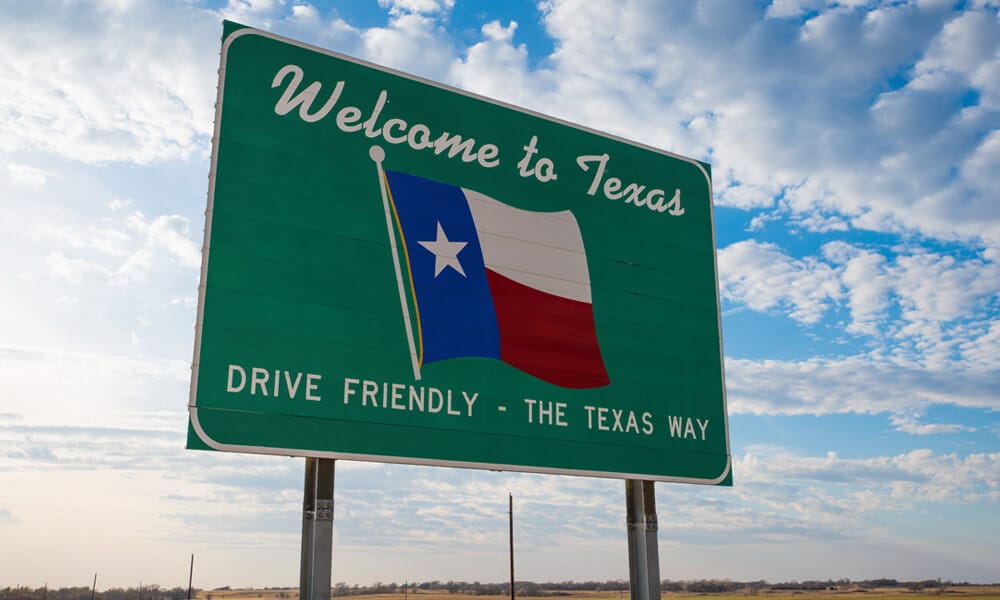-
- Market Research
- |
- CBD Near Me
- |
- Giveaways
- |
- Newsletter
- |
- Contact
- |
- Advertise
- |
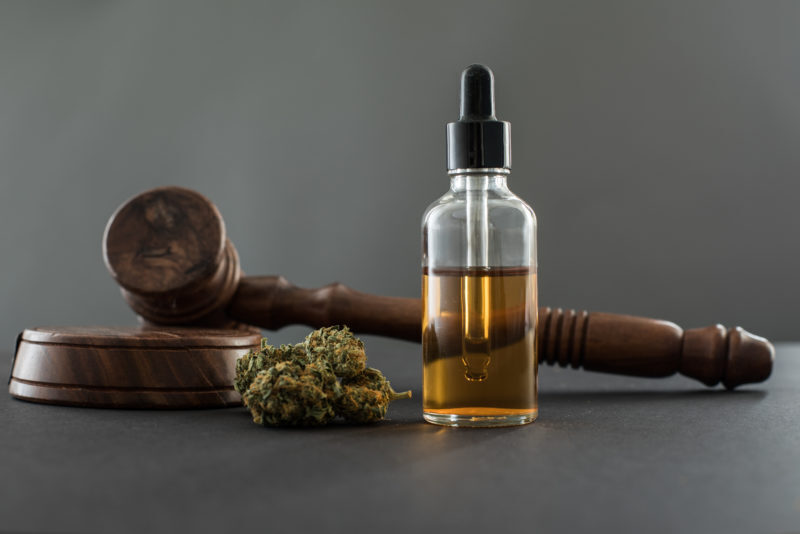
Table of Contents
The question “Is CBD legal in [insert name of state here]?” is quite the buzz-phrase lately. With CBD on a direct trajectory to alternative medicine stardom but still closely linked to the ole pot leaf, it’s understandable that the masses need to know whether this new potential wonder-oil is actually legal.
Aside from researching CBD’s efficacy and uses, the question of legality is undoubtedly important to truly understanding what CBD is all about and how political leaders in the U.S. are handling its status. This article is intended to be used as a guide for anyone who wants to know more about CBD; from the interested new buyer to long-time users to those who are exploring the legality of a new business venture.
Table of Contents
- The Answer Is Not Always Simple
- Hemp-Derived vs. Marijuana-Derived CBD
- The Federal Shadow
- An Online Loophole, Perhaps?
- Recommended Brands for Ordering Online
- The Nifty Fifty+
- From Alabama to Wyoming
- The State-By-State Breakdown
State-By-State Legality
(Click on the map to find out the legal status of CBD in your state)
The Answer Is Not Always Simple
Unfortunately, a Google search doesn’t yield simple a simple yes or no to whether CBD is legal overall. A current search for clarification on the legality of CBD requires the right questions and an eye for legal codes.
It doesn’t help that the answer gets murkier as the questions get more granular as not only each state has its own laws and nuances, but each county and city might also have specific ordinances and regulations.
This article will focus on a state-by-state analysis but, particularly for anyone looking to sell CBD, local laws should always be checked as well.
Hemp-Derived vs. Marijuana-Derived CBD
CBD is generally referred to as just “CBD,” but there is actually an important distinction at least from a legal perspective. CBD can be derived from both hemp and marijuana.
The Legal Difference
The difference between hemp-derived and marijuana-derived CBD is predominantly the legal definition. As per the US Department of Agriculture (USDA), hemp and marijuana are different varieties of the same plant (Cannabis).
The primary difference between hemp and marijuana is the level of THC.
The USDA further specifies that the level of THC in marijuana, generally, is between 3% and 15%, while hemp has less than 1% THC.
However, the more accurate measure is that marijuana can contain around 30% THC and hemp, to legally be considered “hemp,” must be 0.3% or less.
What this really means is that marijuana can get the user high while hemp cannot, which is the driving concern for lawmakers and why the differentiation exists from a legal point-of-view.
It should be noted that the USDA one-page information sheet states that there is no visible difference between hemp and marijuana but, as Discover CBD points out, seasoned growers and users are likely to quickly spot the differences.
What Does This Difference Mean for Consumers and Sellers of CBD?
The origins of CBD will affect its legality.
Generally, this is more of a concern for sellers rather than users as the feds aren’t necessarily busting down residential doors to inspect someone’s CBD oil but are more likely to charge the business the illegal CBD came from.
For purposes of avoiding fines and criminal charges, it’s vital to know how the legal definition affects selling and buying.
The 2014 Farm Bill
Marijuana-derived CBD is illegal under federal law, which will be discussed more at length a bit later, but hemp-derived CBD is a particular mess convoluted by inaccuracies and misunderstandings on the internet.
There are many claims that hemp-derived CBD is legal in all 50 states.
Those claims are incorrect, but not for much longer.
For most sellers and users, the legality of hemp-derived CBD was rooted in the 2014 Farm Bill, which has a carveout for industrial hemp.
Before the 2014 Farm Bill’s expiration on September 30, 2018, it allowed for hemp growing under a state pilot program, for academic research, or under state law so long as an institution of higher education or state department of agriculture located within the state conducted such research.
According to a July 2018 article from Vice, “forty states passed legislation authorizing pilot programs, and 19 of those states have active programs, cultivating and researching hemp under the guidelines.”
That means, as of 2018, if you were growing hemp in the remaining ten states, you were committing a felony.
A careful reading of the 2014 Farm Bill as it related to industrial hemp makes clear that it was quite narrowly construed.
If you were a CBD producer, you’d have to source from a grower who was compliant under the restrictions of the Farm Bill.
As a seller, you have to do your research on where the hemp originated that yielded the oil. Even as a buyer, you’d want to buy only hemp-derived CBD that is Farm Bill compliant.
This surely is not the standard.
A Forbes article from April 2018 entitled “No, CBD is Not Legal in All 50 States,” put it nicely: “given how widespread these products are, it’s unlikely that all of them were sourced from research hemp.”
The 2018 Farm Bill
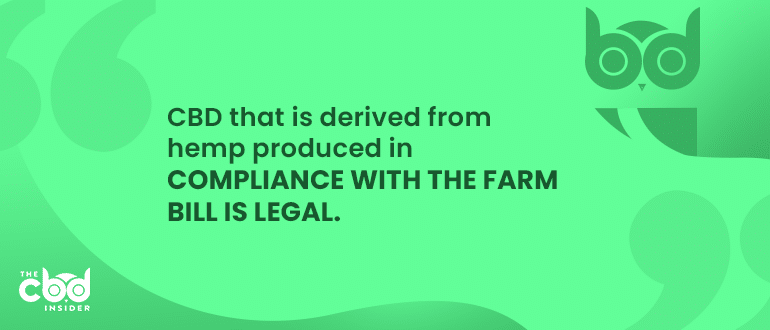
Since the 2014 Farm Bill has expired, the parameters of its replacement, the 2018 Farm Bill, have been in active discussions since early 2018.
On December 20, 2018, President Trump signed the 2018 Farm Bill into law.
In short, it does legalize the production of hemp, but it is still heavily regulated.
There are several positive changes between the 2014 and 2018 Farm Bills. The 2018 Bill is more expansive. In a recent article from the Brookings Institution, John Hudak noted the following changes:
- Expansion beyond pilot programs: The 2018 Bill “allows hemp cultivation broadly, not simply pilot programs for studying market interest in hemp-derived products.”
- Interstate commerce: The 2018 Bill “explicitly allows the transfer of hemp-derived products across state lines for commercial or other purposes. It also puts no restrictions on the sale, transport, or possession of hemp-derived products, so long as those items are produced in a manner consistent with the law.”
As Hudak’s article continues, he points out that the 2018 Bill “does not create a completely free system in which individuals or businesses can grow hemp whenever and wherever they want.”
The Bill still imposes several restrictions.
- The definition of hemp: Per section 297A of the Bill, hemp is still defined as that which comes from the Cannabis sativa L. plant, or any part thereof, containing not more than 0.3 percent THC on a dry weight basis. Production of a cannabis plant with more than 0.3% THC would be illegal under federal law.
- Shared regulatory development: Under section 10113 of the Bill, Hudak summarizes: “[S]tate departments of agriculture must consult with the state’s governor and chief law enforcement officer to devise a plan that must be submitted to the Secretary of USDA.”
A state’s plan to license and regulate hemp can only begin after approval from the USDA.
If a state decides not to devise their own regulations for producing and licensing hemp, the default regulations are those devised by the USDA.
Additionally, section 297B(a)(3), which was added to section 10113 of the Bill explicitly notes that, “Nothing in this subsection preempts or limits any law of a State or Indian tribe that (i) regulates the production of hemp; and (ii) is more stringent than this subtitle.”
Basically, if a state chooses to regulate the production of hemp and those regulations are more stringent than what is required in the Bill, state law wins.
- Illegal actions and consequences thereof: The 2018 Bill also discusses illicit actions, such as producing cannabis plants with more than 0.3% THC and/or growing/producing without a license, as well as “possible punishments for such violations, pathways for violators to become compliant, and even which activities qualify as felonies under the law […].”
While the 2018 Farm Bill is a step in the right direction for hemp beware of claims that all CBD is legal.
CBD that is derived from hemp produced in compliance with the Farm Bill is legal since Farm Bill-compliant, hemp-derived products have been removed from the list of Schedule I substances.
However, this does not generally legalize CBD nor its use in food and beverage (which is discussed more extensively in the next section).
The Federal Shadow
Each state will presumably always have a certain level of autonomy in relation to regulating CBD, but the real reason the legality of CBD lacks clarity is due to the federal government’s unwillingness to make marijuana legal.
Since marijuana is a Schedule I substance under the federal government, marijuana-derived CBD is also illegal, as well as hemp-derived CBD not produced in compliance with the Farm Bill.
Along with the updated Farm Bill, there are a few promising developments in the federal rigidity toward marijuana.
FDA Approval of Epidiolex and Other Cannabis Drugs
In June 2018, the FDA approved Epidiolex, which is a CBD-based epilepsy treatment.
This is a huge step because it shows that compelling data, such as the multiple studies on the effects of CBD on seizures, can push the government to change and adapt marijuana regulations.
Prescriptions for Epidiolex were cleared in September 2018, and it is available in all 50 states.
It has been classified as a Schedule V substance.
This is a strong move in the right direction toward hopefully reclassifying CBD under the DEA drug schedule.
This will not apply solely to Epidiolex.
The DEA reclassified FDA-approved drugs that contain CBD derived from cannabis and no more than 0.1 percent “tetrahydrocannabinols” in schedule V.
This means once the FDA approves more drugs like Epidiolex, so long as they contain no more than 0.1% THC, they will be considered a Schedule V substance.
The FDA and CBD
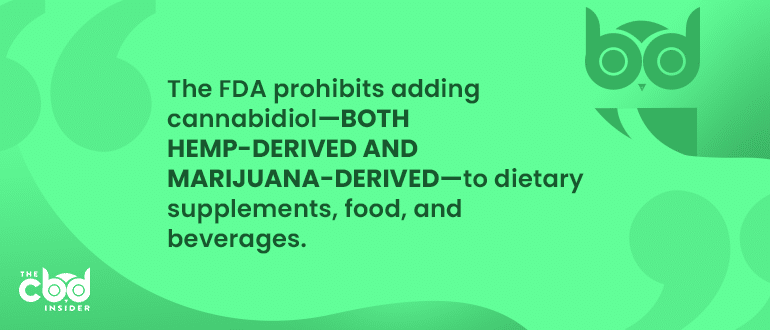
While the FDA has approved Epidiolex, it still considers CBD a drug and thus an illegal food ingredient.
Most states, including California, follow suit on this.
The FDA prohibits adding cannabidiol—which means both hemp-derived and marijuana-derived—to dietary supplements, food, and beverages.
However, the FDA does allow for industrial hemp seed oil in food as it has been Generally Recognized As Safe.
Despite the seemingly hard stance on CBD in the black-and-white FDA regulations, there was a memo issued in May 2018 in which the FDA informed the DEA that it supports removing CBD from the Schedule I list of controlled substances to the Schedule V list.
The memo was issued after the FDA’s approval of Epidiolex and essentially noted that CBD does not produce physical dependence or cause users to get high.
A Schedule 5 classification would be a huge federal leap for CBD as it would then be alongside drugs like Robitussin.
The memo also notes that CBD shouldn’t be a controlled substance, but international treaties require it to be classified as such.
Specifically, “Schedule I of the 1961 Convention does include ‘extracts’ of cannabis,” and the “DEA asserted that given the controls mandated by the 1961 Convention, the United States would not be able to keep its obligations under the treaty if CBD were decontrolled under the CSA.”
If the treaties change, it appears there would be no barrier to removing CBD from the controlled substances categorization altogether.
An Online Loophole, Perhaps?
Amongst all these regulations and legal ambiguity, can the trouble be sidestepped by ordering CBD online?
Is CBD Legal to Buy Online and Be Shipped Throughout the U.S.?
No surprise here, the answer is not exactly simple.
Technically, under federal law, it is not legal to mail CBD since it is currently classified as a Schedule 1 Substance.
In fact, just in 2018, the United States Postal Service issued a decision on an appeal as to the nonmailability of CBD.
However, under the 2018 Farm Bill, a state may not prohibit shipping and/or transporting hemp and hemp products.
This means hemp-derived CBD is legal to mail so long as it is produced in compliance with the 2018 Farm Bill.
In an article from Vice, DEA spokesperson, Rusty Payne, had this to say about the DEA’s intent to enforce regulations on CBD: “Now, does that mean we’re going to come in and search warrant your house? […] No, we’ve got bigger fish to fry. We are in the midst of an opioid epidemic. I think people think (CBD) is high on the priority list right now. It is not.”
Recommended Brands for Ordering Online
The best odds for a legal online transaction is to order via a Farm Bill compliant company or, if anything, order industrial hemp-derived CBD oil.
Also, be a prudent buyer. Any store that represents its CBD products as a cure-all treatment is likely not a reputable seller.
The following are some of the brands that The CBD Insider has concluded are reputable:
- Bluebird Botanicals
- CBDistillery
- Hemp Health Inc
- Hemp Hookahzz
- Panacea Life Sciences
- Plus CBD Oil
- Pur7
- Receptra Naturals
- Select CBD
The Nifty Fifty+
Marijuana is illegal on the federal landscape, but a handful of states have decided to progress without the US government.
There are also specific, non-state areas that may have their own rules, such as Native American reservations and Washington D.C.
The Federally Controlled Lands
Federally-controlled lands fall under federal law; however, there are a couple of carve-outs: Native American reservations, Guam, Puerto Rico, and Washington D.C.
Guam and Puerto Rico
Guam legalized medical marijuana for those with debilitating conditions back in 2014.
The law hasn’t really become operational but, as of October 9, 2018, Guam’s governor, Eddie Calvo, signed a new bill into law which allows for qualified users and/or their caregivers to grow marijuana in their homes, at least until the government’s cannabis program becomes fully functioning.
Prospective growers must obtain a permit from the Department of Public Health and Social Services and, once approved, are limited to six flowering plants and 12 juvenile plants at a time.
For CBD, you would likely need a doctor’s recommendation for use.
In 2016, Puerto Rico passed a medical cannabis law, marijuana is still illegal for recreational use.
Additionally, Medical Marijuana, Inc. was approved to sell their CBD products.
Washington, D.C.
Medical marijuana has been legal in D.C. since 1998, but Initiative 71 legalized marijuana for adult, recreational use in 2014.
The Initiative permitted the use of up to two ounces of marijuana and the possession and cultivation of up to three marijuana plants.
With marijuana legalized for recreational use, it follows that marijuana-derived CBD is also legal.
There is a slight nuance to D.C.’s law. According to Ballotpedia, “[a]lthough Initiative 71 legalized possession and cultivation of marijuana in limited amounts, the measure did not allow for the sale of marijuana in Washington D.C.”
To navigate this restriction, businesses deal with marijuana on a gift economy basis.
A D.C. business sells an item “unrelated to marijuana at marked-up prices and subsequently provide marijuana as a stated bonus or gift alongside the transaction.”
Native American Reservations
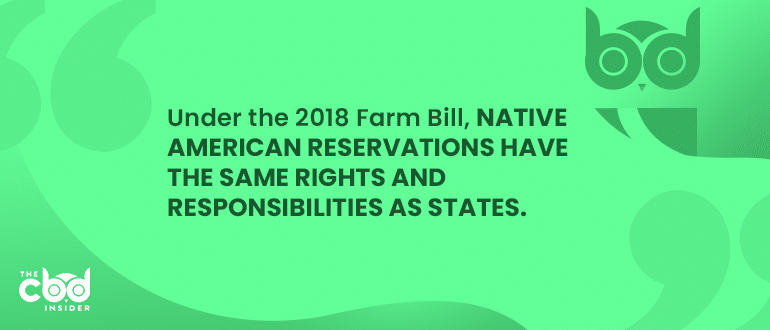
Under the 2018 Farm Bill, Native American reservations have the same rights and responsibilities as states when it comes to hemp and hemp products.
Namely, that “the Indian tribe desiring to have primary regulatory authority over the production of hemp in the State or territory of the Indian tribe shall submit to the Secretary, through the State department of agriculture (in consultation with the Governor and chief law enforcement officer of the State) or the Tribal government, as applicable, a plan under which the State or Indian tribe monitors and regulates that production […].”
For marijuana, this question does not have a simple answer.
The status of marijuana will differ from territory-to-territory, and for some, state-to-state.
There are two important regulatory acts to be aware of for Native American reservations:
- The Wilkinson Memo: Issued in 2014, and still in effect, the Wilkinson memo “provides that eight enumerated federal priorities ‘will guide United States Attorneys’ marijuana enforcement efforts in Indian County’” including where ‘sovereign Indian Nations seek to legalize the cultivation or use of marijuana in Indian Country.’” Sliwoski notes that what it really comes down to is prosecutorial discretion, which basically means the federal guidelines are pretty gray.
- Public Law 280: According to this federal statute, certain states can assume jurisdiction over offenses committed by or against Indians on Indian territory. According to Sliwoski, “[t]he Act mandated a transfer of federal law enforcement authority within tribal nations to state governments in six states: California, Minnesota (except the Red Lake Nation), Nebraska, Oregon (except the Warm Springs Reservation), Wisconsin (except the Menominee Indian Reservation), and, upon its statehood, Alaska.”
It doesn’t necessarily mean that a Native American territory loses its sovereignty, it just means there may be state-placed barriers.
More information on how this plays out in California can be found here in the legislative code.
From Alabama to Wyoming
| CATEGORY | STATES |
| Marijuana-derived CBD is legal | Alaska, California, Colorado, Maine, Massachusetts, Michigan, Nevada, Oregon, Vermont, Washington |
| Marijuana-derived CBD is illegal, except for limited/medical use | Alabama, Arizona, Arkansas, Connecticut, Delaware, Florida, Georgia, Hawaii, Illinois, Kentucky, Louisiana, Maryland, Minnesota, Mississippi, Missouri, Montana, New Hampshire, New Jersey, New Mexico, New York, North Carolina, North Dakota, Ohio, Oklahoma, Pennsylvania, Rhode Island, South Carolina, Tennessee, Texas, Utah, Virginia, West Virginia, Wisconsin |
| Marijuana-derived CBD is illegal | Idaho, Indiana, Iowa, Kansas, Nebraska, South Dakota, Wyoming |
Now, onto CBD’s status in the 50 states.
The issue of legality is mostly on marijuana-derived CBD since hemp-derived CBD is almost legal across the board so long as it is produced and licensed in compliance under the 2018 Farm Bill.
However, as discussed earlier, the Bill does allow for states to develop their own regulatory plan for hemp production, which could be more stringent than the federal regulatory plan.
Additionally, some states are still catching up to the federal position, thus, the legality of hemp-derived CBD will be tenuous in some states for a short time.
The states where hemp-derived CBD is currently illegal are (some have bills for legalization currently going through the legislature):
- Idaho
- Mississippi
- South Dakota
As for marijuana-derived CBD, it’s legal in some states, illegal in a few, and in some states, is legal for qualifying medical but not recreational use.
(It’s hard to understand why the legality of marijuana-derived CBD is even an issue in this day and age, especially when the general goal of even marijuana-derived CBD is not to get you high.)
It appears, in a purely editorial, but well-researched opinion, that marijuana-derived CBD is illegal in some states because either the state wishes to defer to the federal standard, which still considers marijuana a Schedule I substance, and/or because the voters themselves are not ready for the legalization of marijuana and CBD is seen as a slippery slope.
States Where Marijuana-Derived CBD Is Legal
Marijuana-derived CBD is legal in 10 states: Alaska, California, Colorado, Maine, Massachusetts, Michigan, Nevada, Oregon, Vermont, and Washington.
States Where Marijuana-Derived CBD Is Illegal but With a Caveat for Limited and/or Medical Use
The grand majority of states fall into this category, with 34 states saying no to recreational use of marijuana-derived CBD but allowing for limited and/or medical purposes.
These states are: Alabama, Arizona, Arkansas, Connecticut, Delaware, Florida, Georgia, Hawaii, Illinois, Kentucky, Louisiana, Maryland, Minnesota, Mississippi, Missouri, Montana, New Hampshire, New Jersey, New Mexico, New York, North Carolina, North Dakota, Ohio, Oklahoma, Pennsylvania, Rhode Island, South Carolina, Tennessee, Texas, Utah, Virginia, West Virginia, Wisconsin, and Wyoming.
States Where Marijuana-Derived CBD Is Completely Illegal
Six states say absolutely no to marijuana-derived CBD: Idaho, Indiana, Iowa, South Dakota, Nebraska, and Kansas.
A Palatable Nuance
There are several nuances to state laws on CBD, but one aspect is particularly worth noting.
In some of the states where CBD is legal, it is prohibited to put CBD oil into food and beverages.
This is predominantly due to the pertinent state modeling FDA restrictions.
This is an important nuance because, for example, in California, which explicitly prohibits CBD from being added to food and beverage products, several vendors sell marijuana-derived CBD-based edibles.
The State-By-State Breakdown
For ease of quick reference, next to each state is a category.
- Category 1: For states where marijuana-derived CBD is legal.
- Category 2: For states where marijuana-derived CBD is illegal, but the state allows for limited or medical use.
- Category 3: For states where marijuana-derived CBD is illegal.
Alabama – Category 2
- Is it legal for recreational use? No.
- Is it legal under any exception(s)? Yes. Alabama has two exceptions that allow for the use of CBD if you have a debilitating medical condition: Carly’s Law and Leni’s Law.
- Carly’s Law: This exception allows for use of CBD for a person with a debilitating epileptic condition, but it must be through a prescription authorized by the UAB Department.
- Leni’s Law: This exception expanded upon Carly’s Law regarding qualifying conditions and who may provide or make the recommendation. Under Leni’s Law, the qualifying medical condition is not limited to debilitating epilepsy, rather it includes anyone with a diagnosis of a serious condition that is resistant to conventional medicine (such as severe or chronic pain, or severe nausea). It also includes diagnosis from a physician with whom the person has a bonafide physician-patient relationship (versus Carly’s Law requiring UAB authorization). Finally, the physician must recommend CBD on the basis that it is likely to provide the patient with therapeutic or palliative relief.
- What does the legislative future hold? In brief, the future probably does not hold the legalization of cannabis in Alabama. The state is aggressively crimson in political alignment and, according to Representative Mike Holmes, the Alabama constituents aren’t ready for marijuana decriminalization. While there does seem to be something of a push to revise the punishments for possession of marijuana, no bills have survived the House Judiciary Committee. There is alleged bipartisan support to revise sentencing for possession, but outright legalization is far off in the future as even the former Democratic candidate for governor, Walt Maddox, wanted to take a wait-and-see approach to marijuana.
Alaska – Category 1
- Is it legal for recreational use? Yes. Alaska also allows CBD-based edibles.
Arizona – Category 2
- Is it legal for recreational use? No. Marijuana is illegal, and therefore marijuana-derived CBD is illegal.
- Is it legal under any exception(s)? Yes. In 2010, the Arizona Medical Marijuana Act legalized the use of marijuana for qualifying debilitating medical conditions.
- What does the legislative future hold? It seems promising. Medical use of marijuana already has a carve-out, and although Proposition 205 was rejected by Arizona voters in 2017, it only lost by 2.6 percent of the vote. The support is there, it just needs the right legislators to back it.
Arkansas – Category 2
- Is it legal for recreational use? No. Marijuana is illegal for recreational use and so is any part thereof.
- Is it legal under any exception(s)? Yes. Arkansas allows medical use for those with a qualifying medical condition who want to use marijuana or marijuana-based products, such as marijuana-derived CBD with more than 3% THC. It requires a medical certificate from a licensed physician.
- What does the legislative future hold? Legalization is probable in the next few years.
California – Category 1
- Is it legal for recreational use? Yes. However, no edibles. In California, CBD cannot be put into food or drink and sold.
- More information on the food restriction: Basically, it’s California’s deference to the FDA, “California incorporates federal law regarding food additives, dietary use products, food labeling, and good manufacturing practices for food.” The FDA has concluded that it is “a prohibited act to introduce or deliver for introduction into interstate commerce any food (including any animal food or feed) to which tetrahydrocannabinol (THC) or CBD has been added. This is regardless of the source of the CBD – derived from industrial hemp or cannabis.”
- Do people follow the law? The law is unlikely to change until the FDA changes its restrictions, but societal demand is high enough for even large retailers to skirt the law. A recent LA Times article wrote, “Products infused with hemp-derived CBD are still being peddled throughout the Golden State. They’re sold in corner stores and health food markets such as Lassens and Erewhon and in coffee shops that sling $8 lattes fortified with CBD oil.” So it’s illegal, but sellers are still providing for the market demand.
Colorado – Category 1
- Is it legal for recreational use? Yes.
- Any food restrictions? Yes. Colorado only allows hemp-derived CBD with no more than 0.3% THC to be added to food items, which means marijuana-derived CBD cannot be added to food.
Connecticut – Category 2
- Is it legal for recreational use? No.
- Is it legal under any exceptions? Yes. Marijuana-derived CBD can be used for medicinal purposes within certain restrictions, namely a debilitating medical condition diagnosed by a Connecticut-licensed physician.
- What does the legislative future hold? Legalization is likely based on comments made by the new Connecticut Governor Ned Lamont, in which he expressed legalization of marijuana is one of his priorities, which would lead to the legalization of marijuana-derived CBD.
Delaware – Category 2
- Is it legal for recreational use? No. Marijuana and any part thereof is still considered a Schedule I substance.
- Is it legal under any exception(s)? Yes. Marijuana-derived CBD is available under Delaware’s Medical Marijuana Act for patients diagnosed with a debilitating medical condition.
- What does the legislative future hold? It’s just a matter of time before marijuana is legalized in Delaware. A recent article noted that the majority of legislators support legalization and 2018’s vote only fell four votes short.
Florida – Category 2
- Is it legal for recreational use? No. Marijuana is still a controlled substance
- Is it legal under any exception(s)? Yes. Marijuana and marijuana-derived CBD can be used for medicinal purposes under certain restrictions, namely: marijuana-derived CBD with less than 0.8% THC is legal for patients suffering from specific medical conditions.
- What does the legislative future hold? Recreational use of marijuana did not make it onto the ballot in 2018, but that doesn’t mean legalization won’t happen in the future. Support for recreational use is estimated between 49-60%.
Georgia – Category 2
- Is it legal for recreational use? No.
- Is it legal under any exception(s)? Yes. The Haleigh’s Hope Act allows for marijuana-derived CBD to be used for medicinal purposes so long as the CBD has less than 5% THC and is used for state-defined, specific medical conditions.
- What does the legislative future hold? It doesn’t look like it’s something that will happen in the immediate future as Georgia is still struggling to get their medical marijuana program operational. However, a committee recently suggested in-state medical cannabis cultivation, so there is a little movement.
Hawaii – Category 2
- Is it legal for recreational use? No.
- Is it legal under any exception(s)? Yes. Hawaii has a medical marijuana program under which marijuana-derived CBD can be used for certain medical conditions so long as it has less than 5% THC.
- What does the legislative future hold? It looks positive for recreational legalization as there is political representative support, but residents will have to wait an estimated 3-5 years.
Idaho – Category 3
- Is it legal for recreational use? No.
- Is it legal under any exception(s)? No. The state does not offer any sort of medical cannabis program.
- What does the legislative future hold? Idaho is still at the discussion point, and marijuana legalization on any level is a hot-button issue. As it’s not available for medicinal use yet, recreational use is a long way off. There is some support but also a lot of push-back from constituents.
Illinois – Category 2
- Is it legal for recreational use? No.
- Is it legal under any exception(s)? Yes. Illinois allows medical cannabis for several qualifying medical conditions.
- What does the legislative future hold? Legalization is likely in the near future as Michigan just legalized recreational use and, according to an article from the Chicago Tribune, a marijuana-friendly governor was elected in 2018.
Indiana – Category 3
- Is it legal for recreational use? No.
- Is it legal under any exception(s)? No. The law does allow for CBD hemp oil with less than 0.3% THC, but that’s been legalized under the 2018 Farm Bill. Marijuana-derived CBD has no exception in Indiana.
- What does the legislative future hold? It’s unclear. There’s constituent support, but the road to full legalization is uphill since no medical use exception exists yet.
Iowa – Category 3
- Is it legal for recreational use? No.
- Is it legal under any exception(s)? No. Similar to Indiana, the state allows for CBD oil with 3% or less THC for certain qualifying conditions but, again, that’s just hemp-derived CBD oil which is legal within the parameters of the 2018 Farm Bill.
- What does the legislative future hold? Iowa is arguably a long way off. This article touts progress but the medical marijuana program it refers to is the same CBD hemp oil that’s already allowed under the Farm Bill.
Kansas – Category 3
- Is it legal for recreational use? No.
- Is it legal under any exception(s)? No. However, Kansas did pass a law in 2018 that removes cannabidiol from the definition of marijuana. They also have a law that allows for CBD products with zero percent THC, which means marijuana-derived CBD is illegal.
- What does the legislative future hold? The future of legalization here looks better than Iowa and Indiana, and marijuana-supporter Laura Kelly was elected governor.
Kentucky – Category 2
- Is it legal for recreational use? No.
- Is it legal under any exception(s)? Yes. The state does not technically have a medical cannabis program but, under the Clara Madeline Gilliam Act, a physician practicing at a state research hospital can prescribe cannabidiol for certain medical conditions.
- What does the legislative future hold? Kentucky will likely fight legislation to legalize marijuana.
Louisiana – Category 2
- Is it legal for recreational use? No.
- Is it legal under any exception(s)? Yes. The state allows for medicinal use for specific medical conditions.
- What does the legislative future hold? Louisiana is extremely conservative, and full legalization will be slow.
Maine – Category 1
- Is it legal for recreational use? Yes. Marijuana has been categorized as a Schedule Z drug.
Maryland – Category 2
- Is it legal for recreational use? No.
- Is it legal under any exception(s)? Yes. Maryland has a medical cannabis program for qualifying medical conditions.
- What does the legislative future hold? It’s a bit gray but a bill to legalize cannabis for recreational use is likely to occur sooner rather than later, but Maryland tends to defer to the federal standard.
Massachusetts – Category 1
- Is it legal for recreational use? Yes. Marijuana is classified as a Schedule D substance. Additionally, a
- by the Democratic state senator, which, if passed, would “would bar employers from firing workers for using marijuana legally on their own time.”
Michigan – Category 1
- Is it legal for recreational use? Yes. Michigan just recently legalized marijuana.
Minnesota – Category 2
- Is it legal for recreational use? No.
- Is it legal under any exception(s)? Yes. Marijuana and marijuana-derived CBD is legal for physician-approved patients with certain qualifying conditions.
- What does the legislative future hold? Legalization is a likely possibility as the governor-elect supports it, but he has stated it’s not his priority.
Mississippi – Category 2
- Is it legal for recreational use? No.
- Is it legal under any exception(s)? Yes. Under the Harper’s Grace Law, CBD can be used to treat debilitating epilepsy so long as the CBD has no more than 5% THC.
- What does the legislative future hold? The initiative to legalize was not put on the ballot in 2018, and full legalization may be a bit further into the future.
Missouri – Category 2
- Is it legal for recreational use? No.
- Is it legal under any exception(s)? Yes. The law allows physicians to recommend medical marijuana at their discretion for serious illnesses and medical conditions.
- What does the legislative future hold? As medical marijuana was just legalized in 2018, recreational use may have another year or two before legalization.
Montana – Category 2
- Is it legal for recreational use? No.
- Is it legal under any exception(s)? Yes. The law has been evolving since 2004, but, essentially, physicians can prescribe marijuana for a debilitating condition.
- What does the legislative future hold? It looks like an initiative to legalize will make it onto the ballot in 2020.
Nebraska – Category 3
- Is it legal for recreational use? No.
- Is it legal under any exception(s)? No. Nebraska follows the federal standard.
- What does the legislative future hold? Full legalization will have to wait until the federal government changes the law, but medical marijuana use will likely be on the ballot in 2020.
Nevada – Category 1
- Is it legal for recreational use? Yes. Nevada legalized marijuana in 2016.
New Hampshire – Category 2
- Is it legal for recreational use? No.
- Is it legal under any exception(s)? Yes. New Hampshire has a medical cannabis act that allows the use of marijuana and marijuana derivatives for a qualifying medical condition.
- What does the legislative future hold? It’s almost a sure thing that New Hampshire will legalize marijuana in 2019.
New Jersey – Category 2
- Is it legal for recreational use? No.
- Is it legal under any exception(s)? Yes. New Jersey has a medical marijuana law that allows for the use of marijuana and marijuana derivatives for several debilitating medical conditions.
- What does the legislative future hold? It looks like 2020 might be the year New Jersey legalizes marijuana. This article from Marijuana Moment discusses a bill that New Jersey voters will have the chance to reform marijuana on the 2020 ballot.
New Mexico – Category 2
- Is it legal for recreational use? No.
- Is it legal under any exception(s)? Yes. New Mexico has a medical marijuana use exception, codified in 2007, for seriously ill patients on the advice of a medical doctor.
- What does the legislative future hold? It’s a bit unclear. There are many people against it due to a belief that car accidents and crime will rise, but the newly elected governor seems to support legalization as it would bring the state revenue.
New York – Category 2
- Is it legal for recreational use? No.
- Is it legal under any exception(s)? Yes. New York has a medical marijuana exception for qualifying conditions.
- What does the legislative future hold? Legalization will likely happen soon since recently re-elected Governor Cuomo made it one of his top priorities; however, it is uncertain if 2019 will be the year it happens.
North Carolina – Category 2
- Is it legal for recreational use? No. Though it should be noted that North Carolina classifies marijuana as a Schedule IV drug.
- Is it legal under any exception(s)? Yes, but it is so limited, the answer is a shade away from no. North Carolina allows the use of marijuana-derived CBD oil specifically, but it cannot contain more than 0.9% THC and is only for people who have been diagnosed by a neurologist as having refractory epilepsies.
- What does the legislative future hold? With such limited medical use, full legalization of cannabis might be a long way off, but there is some support from elected officials.
North Dakota – Category 2
- Is it legal for recreational use? No.
- Is it legal under any exception(s)? Yes. North Dakota allows for the use of medical marijuana for various qualifying conditions.
- What does the legislative future hold? The divide on legalization is close but supporters are outnumbered. The state measure that would have legalized marijuana did not pass in 2018 due to a 59% vote against.
Ohio – Category 2
- Is it legal for recreational use? No.
- Is it legal under any exception(s)? Yes. Ohio signed a law in 2016 allowing for medical use of marijuana for certain medical conditions, but, as of the end of 2018, the program was still not operational.
- What does the legislative future hold? A measure for legalization looks like it will make it onto the ballot in 2019.
Oklahoma – Category 2
- Is it legal for recreational use? No.
- Is it legal under any exception(s)? Yes. The state allows for use of marijuana for medicinal purposes. Oklahoma also has a separate law allowing for use of CBD with no more than 0.3% THC by minors with severe epileptic conditions.
- What does the legislative future hold? The support for legalization is growing but not quite there yet.
Oregon – Category 1
- Is it legal for recreational use? Yes. Oregon legalized the adult use of marijuana in 2014. A San Francisco Chronicle article also reported the state recently decided to allow medical marijuana specifically to be delivered to rural parts of the state “where licensed marijuana activity is prohibited.”
Pennsylvania – Category 2
- Is it legal for recreational use? No.
- Is it legal under any exception(s)? Yes. Pennsylvania has a medical use exception for various qualifying conditions.
- What does the legislative future hold? It’s not likely that recreational use will be legalized soon in Pennsylvania as the state legislators are not yet on board.
Rhode Island – Category 2
- Is it legal for recreational use? No.
- Is it legal under any exception(s)? Yes. The state has a medical use law.
- What does the legislative future hold? There’s a high possibility for legalizing marijuana but nothing is firm yet.
South Carolina – Category 2
- Is it legal for recreational use? No.
- Is it legal under any exception(s)? Yes. South Carolina allows for anyone suffering from refractory seizures diagnosed by a neurologist so long as the CBD has less than 0.9% THC.
- What does the legislative future hold? Full blown legalization of marijuana is probably a long way off since the medical use exception is extremely narrow, but there is support for at least legalizing marijuana for medical use.
South Dakota – Category 3
- Is it legal for recreational use? No.
- Is it legal under any exception(s)? Not really. The state has removed CBD oil from the definition of marijuana; however, it only applies to CBD oil that has been approved by the FDA (like Epidiolex).
- What does the legislative future hold? Legalization is pretty far out into the future for South Dakota as the state is extremely stringent on cannabis. It’s predicted that South Dakota legislators will even fight hemp-derived CBD despite the 2018 Farm Bill.
Tennessee – Category 2
- Is it legal for recreational use? No. Though it is categorized as a Schedule IV drug.
- Is it legal under any exception(s)? Yes. Similar to South Carolina, Tennessee allows for the use of marijuana-derived CBD with less than 0.9% THC for people with refractory seizures.
- What does the legislative future hold? Tennessee is conservative and, given the exception for medical use is stringently narrow, it’s unlikely full legalization will occur any time soon.
Texas – Category 2
- Is it legal for recreational use? No.
- Is it legal under any exception(s)? Yes. Texas has a CBD-specific exception which allows people with refractory epilepsy to use CBD so long as it has less than 0.5% THC.
- What does the legislative future hold? Bipartisan support is growing for the legalization of marijuana or at least a broader medical use exception, but legalization is not projected to happen in the immediate future.
Utah – Category 2
- Is it legal for recreational use? No.
- Is it legal under any exception(s)? Yes. Utah passed a medical marijuana use act in 2018. They also passed a hemp and cannabidiol act in 2018 but the act specifies that no more than 0.3% THC is permitted in the oil, which means only hemp-derived is permitted.
- What does the legislative future hold? As the state just recently allowed the medical use of marijuana, full legalization will likely have to wait a bit longer.
Vermont – Category 1
- Is it legal for recreational use? Yes. Vermont legalized adult use in 2018, though it is relatively limited (e.g.: possession of more than 1 ounce is prohibited).
Virginia – Category 2
- Is it legal for recreational use? No.
- Is it legal under any exception(s)? Yes. Virginia has a CBD-specific exception that allows for use in patients with intractable epilepsy.
- What does the legislative future hold? The state does not yet have a broad medical-use exception so it will be baby steps to full legalization.
Washington – Category 1
- Is it legal for recreational use? Yes. Washington legalized adult use of marijuana back in 2012.
West Virginia – Category 2
- Is it legal for recreational use? No.
- Is it legal under any exception(s)? Yes. West Virginia has a medical cannabis-use law.
- What does the legislative future hold? West Virginia is predicted to legalize marijuana in the very near future.
Wisconsin – Category 2
- Is it legal for recreational use? No.
- Is it legal under any exception(s)? Yes. Wisconsin has a CBD-specific medical-use law for treatment of a medical condition.
- What does the legislative future hold? Wisconsin residents support legalization but the legislature has not made any determinative moves.
Wyoming – Category 3
- Is it legal for recreational use? No.
- Is it legal under any exception(s)? No. Some may argue that Wyoming has a CBD medical use exception, but it only applies to hemp-derived CBD with less than 0.3% THC, which means marijuana-derived CBD is still illegal.
- What does the legislative future hold? A recent poll suggests that nearly half of Wyoming residents support the legalization of marijuana but it hasn’t gained political footing.


